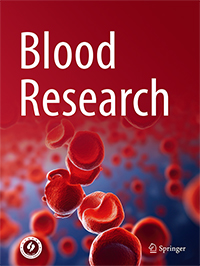Letter to the Editor
 Split Viewer
Split Viewer
Korean J Hematol 2010; 45(4):
Published online December 31, 2010
https://doi.org/10.5045/kjh.2010.45.4.286
© The Korean Society of Hematology
Concerns in assessing risk factors for herpes zoster infection in multiple myeloma patients
Correspondence to : Correspondence to Dong-Gun Lee, M.D. Department of Internal Medicine, The Catholic University of Korea, Seoul St. Mary's Hospital, 505, Banpo-dong, Seocho-gu, Seoul 137-701, Korea. Tel: +82-2-2258-6003, symonlee@catholic.ac.kr
This is an Open Access article distributed under the terms of the Creative Commons Attribution Non-Commercial License (http://creativecommons.org/licenses/by-nc/3.0/) which permits unrestricted non-commercial use, distribution, and reproduction in any medium, provided the original work is properly cited.
REFERENCES
- Nucci, M, Anaissie, E. Infections in patients with multiple myeloma in the era of high-dose therapy and novel agents. Clin Infect Dis, 2009;49;1211-1225.
- Yi, YS, Chung, JS, Song, MK, et al. The risk factors for herpes zoster in bortezomib treatment in patients with multiple myeloma. Korean J Hematol, 2010;45;188-192.
- Choi, WS, Noh, JY, Huh, JY, et al. Seroprevalence of varicella-zoster virus in Korea. J Med Virol, 2010;82;2123-2126.
- Chanan-Khan, A, Sonneveld, P, Schuster, MW, et al. Analysis of herpes zoster events among bortezomib-treated patients in the phase III APEX study. J Clin Oncol, 2008;26;4784-4790.
- Dasanu, CA, Alexandrescu, DT. Does bortezomib induce de facto varicella zoster virus reactivation in patients with multiple myeloma?. J Clin Oncol, 2009;27;2293-2294.
Article
Letter to the Editor
Korean J Hematol 2010; 45(4): 286
Published online December 31, 2010 https://doi.org/10.5045/kjh.2010.45.4.286
Copyright © The Korean Society of Hematology.
Concerns in assessing risk factors for herpes zoster infection in multiple myeloma patients
Dong-Gun Lee, M.D.*
Correspondence to: Correspondence to Dong-Gun Lee, M.D. Department of Internal Medicine, The Catholic University of Korea, Seoul St. Mary's Hospital, 505, Banpo-dong, Seocho-gu, Seoul 137-701, Korea. Tel: +82-2-2258-6003, symonlee@catholic.ac.kr
This is an Open Access article distributed under the terms of the Creative Commons Attribution Non-Commercial License (http://creativecommons.org/licenses/by-nc/3.0/) which permits unrestricted non-commercial use, distribution, and reproduction in any medium, provided the original work is properly cited.
References
- Nucci, M, Anaissie, E. Infections in patients with multiple myeloma in the era of high-dose therapy and novel agents. Clin Infect Dis, 2009;49;1211-1225.
- Yi, YS, Chung, JS, Song, MK, et al. The risk factors for herpes zoster in bortezomib treatment in patients with multiple myeloma. Korean J Hematol, 2010;45;188-192.
- Choi, WS, Noh, JY, Huh, JY, et al. Seroprevalence of varicella-zoster virus in Korea. J Med Virol, 2010;82;2123-2126.
- Chanan-Khan, A, Sonneveld, P, Schuster, MW, et al. Analysis of herpes zoster events among bortezomib-treated patients in the phase III APEX study. J Clin Oncol, 2008;26;4784-4790.
- Dasanu, CA, Alexandrescu, DT. Does bortezomib induce de facto varicella zoster virus reactivation in patients with multiple myeloma?. J Clin Oncol, 2009;27;2293-2294.






 PDF
PDF Standard view
Standard view Export citation
Export citation Share
Share  Previous Article
Previous Article



